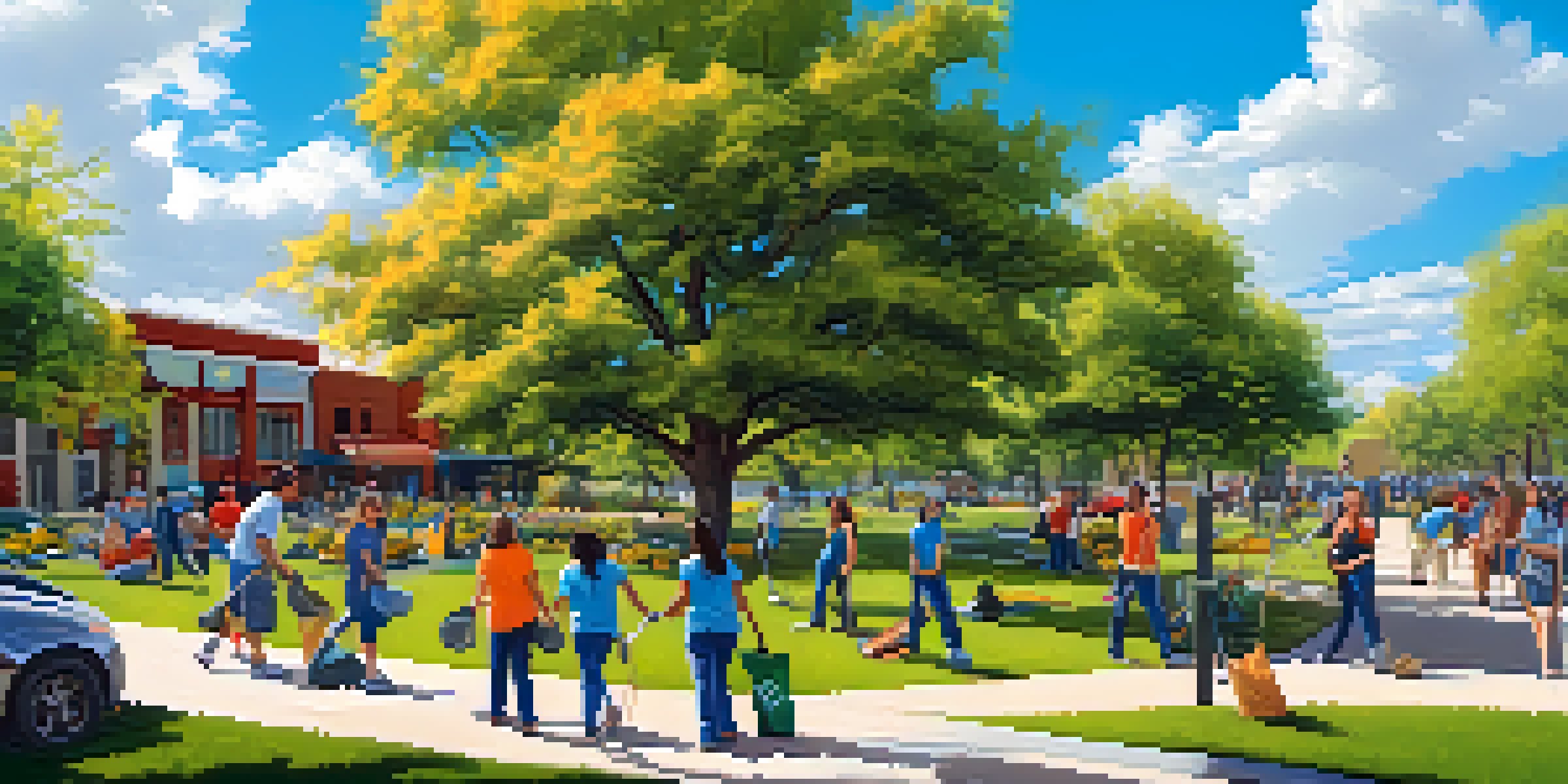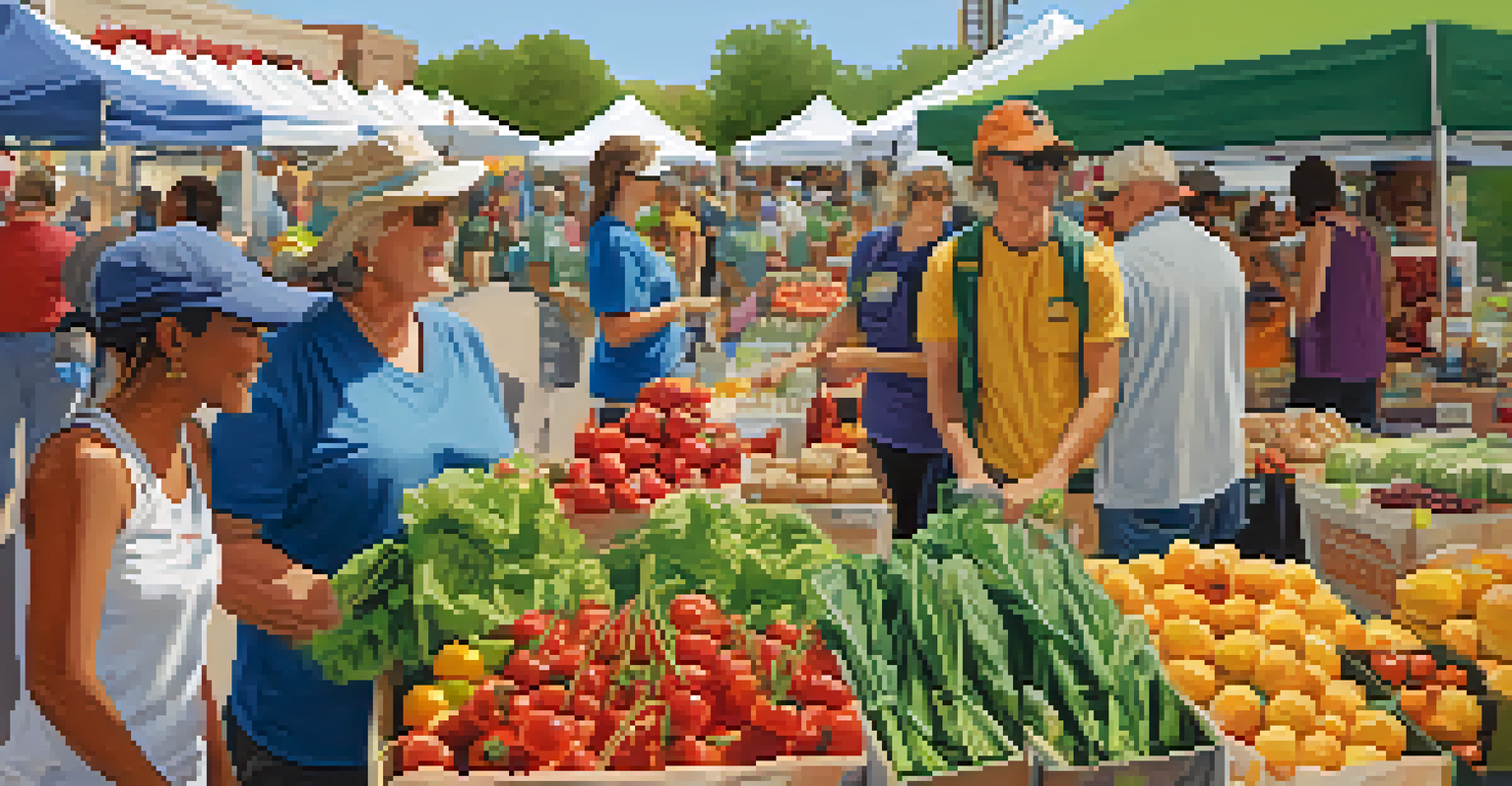The Impact of Volunteerism on Austin's Community Spirit

Understanding Volunteerism and Its Importance in Austin
Volunteerism refers to the act of giving time and effort to help others without financial compensation. In Austin, this spirit of giving is deeply rooted in the community, fostering connections among residents. The city’s unique blend of culture and diversity creates a rich tapestry where volunteer efforts can flourish, making a significant impact on local lives.
Volunteering is the ultimate exercise in democracy. You vote in elections once a year, but when you volunteer, you vote every day about the kind of community you want to live in.
In Austin, volunteering can take many forms—from coaching youth sports teams to participating in environmental clean-ups. Each act of kindness contributes not only to the immediate needs of individuals but also strengthens the fabric of the community as a whole. This collective effort showcases the power of community engagement, encouraging others to join in and make a difference.
Ultimately, understanding volunteerism's role in Austin is essential for recognizing how it nurtures community spirit. When people volunteer, they not only help others but also enhance their own sense of belonging and purpose. This reciprocal relationship between volunteers and the community fosters a vibrant, resilient environment.
The Role of Local Organizations in Promoting Volunteerism
Local organizations play a crucial role in promoting volunteerism throughout Austin. Nonprofits, community groups, and even city initiatives often serve as catalysts for volunteer opportunities, connecting residents with causes that resonate with them. By providing resources and support, these organizations make it easier for individuals to get involved and contribute their time.

For example, groups like Volunteer Austin and the United Way of Greater Austin organize events and campaigns that highlight various volunteer opportunities. These initiatives often address pressing community needs, whether it’s providing meals to the homeless or organizing educational programs for underprivileged youth. Such efforts not only aid those in need but also foster a sense of collective responsibility among community members.
Volunteerism Strengthens Community Ties
Engaging in volunteer activities fosters connections among residents, enhancing trust and camaraderie.
Furthermore, these organizations often facilitate partnerships between volunteers and local businesses, enhancing the potential for community impact. By working together, volunteers can tap into the resources of these businesses, creating a win-win scenario where both the community and local economy thrive. This synergy amplifies the positive effects of volunteerism, reinforcing Austin’s community spirit.
How Volunteerism Strengthens Community Bonds
One of the most significant impacts of volunteerism is its ability to strengthen community bonds. When people come together for a common cause, they form connections that transcend social barriers. Whether through shared experiences at a food bank or collaborating on a neighborhood clean-up, these interactions help build trust and camaraderie among residents.
The best way to find yourself is to lose yourself in the service of others.
Moreover, volunteering allows individuals to learn more about their neighbors and the unique challenges they face. This understanding fosters empathy and compassion, bridging gaps between diverse groups. As people engage with one another, they often find common ground, which can lead to lasting friendships and support systems.
As a result, the community becomes more resilient. When individuals feel connected and supported, they are more likely to stand together during difficult times. This sense of unity is especially important in a diverse city like Austin, where volunteerism can serve as a powerful tool for social cohesion and collective action.
The Positive Effects of Volunteerism on Mental Health
Volunteering is not just beneficial for the community; it also has profound effects on individual mental health. Engaging in volunteer activities can alleviate feelings of loneliness and depression, giving people a sense of purpose and belonging. In Austin, many volunteers report feeling happier and more fulfilled after contributing to their community.
Participating in volunteer work often leads to increased social interactions, which can combat isolation. For many, especially those new to the city or facing challenging circumstances, volunteering serves as a gateway to forming new friendships and connections. This social aspect of volunteering can be particularly beneficial for mental well-being.
Volunteering Boosts Mental Health
Participating in volunteer work provides individuals with a sense of purpose and alleviates feelings of loneliness.
Additionally, the act of helping others can boost self-esteem and confidence. When individuals see the positive impact of their efforts, it reinforces their sense of worth and capability. This cycle of giving and receiving not only benefits the community but also contributes to the overall mental health of Austin’s residents.
Volunteerism and Its Economic Benefits for Austin
While the social aspects of volunteerism are often highlighted, the economic benefits should not be overlooked. Volunteers contribute significant value to local nonprofits and community projects, often saving organizations substantial amounts of money. In Austin, these savings enable nonprofits to allocate more resources toward their core missions and expand their services.
Moreover, volunteerism can stimulate local economies as volunteers often support businesses by purchasing supplies or services needed for their projects. When individuals come together to clean a park or run a charity event, they frequently engage local vendors, creating a ripple effect that boosts economic activity. This interconnectedness fosters a thriving community ecosystem.
Ultimately, investing in volunteerism can yield long-term economic benefits for Austin. By encouraging residents to engage in volunteer work, the city can enhance its social capital while simultaneously supporting local businesses. This dual impact underscores the importance of volunteerism as a vital component of Austin's community and economic health.
Inspiring Stories of Austin Volunteers Making a Difference
Every city has its heroes, and Austin is no exception. There are countless inspiring stories of volunteers who have dedicated their time to make a difference in the lives of others. From individuals providing mentorship to at-risk youth to groups organizing food drives for families in need, these stories highlight the power of community engagement.
Take, for instance, the story of a local teacher who started a reading program for underserved children. By gathering volunteers from the community, she was able to create a supportive environment where children could improve their literacy skills. This initiative not only transformed the lives of the children but also fostered a sense of community pride and collaboration among the participants.
Economic Impact of Volunteer Efforts
Volunteers contribute significant value to local nonprofits, enabling them to allocate more resources toward their core missions.
These narratives of volunteerism fuel further engagement, encouraging others to get involved. When people hear about the positive impact of their neighbors’ efforts, it inspires them to contribute in their own ways. Austin’s vibrant volunteer culture is continually enriched by these heartwarming stories, creating a cycle of giving that strengthens community bonds.
Challenges and Opportunities in Austin's Volunteer Landscape
Despite the vibrant volunteer culture in Austin, there are challenges that can hinder community engagement. One of the main obstacles is the time constraints many residents face due to work and personal commitments. This can make it difficult for individuals to find opportunities that fit their schedules, ultimately impacting volunteer participation.
However, these challenges also present opportunities for innovation. Organizations are increasingly adapting to meet the needs of busy volunteers by offering flexible, short-term projects or virtual volunteer options. By embracing technology and creative solutions, they can engage a broader audience and make volunteering more accessible to everyone in the community.

Addressing these challenges head-on can lead to a more inclusive volunteer landscape in Austin. By creating opportunities that cater to different lifestyles and preferences, the city can ensure that everyone has a chance to contribute. This inclusivity not only enriches the volunteer experience but also strengthens the community spirit that Austin is known for.